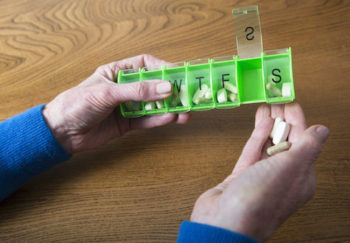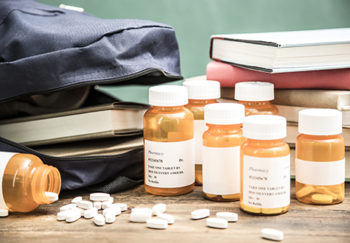
It’s official: U.S. residents are more likely to die from the opioid crisis than a motor vehicle crash, the National Safety Council reports.
In Virginia, deaths from heroin, synthetic opioids and prescription opioids have all increased substantially since 1999, according to the National Institute on Drug Abuse.
How can we prevent more tragedies? UVA researchers and doctors are taking a close look at alternatives, prescribing practices and community education.
Post-Surgery Opioid Alternatives for Pain
In 2011-2015, the average amount of opioids given per surgery at UVA declined by 37 percent, according to an anesthesiology study. Patients instead received more non-opioid pain medications, and they reported less pain. Anesthesiologist Marcel Durieux, MD, PhD, explained that opioids may actually make people more sensitive to pain.
Meanwhile, some UVA surgery teams also implemented the Enhanced Recovery After Surgery (ERAS) program. ERAS includes process improvements and non-opioid pain medications to help patients leave the hospital sooner and get back to their everyday activities. Using new combinations of medications, they’ve reduced opioid use by 59 percent or more, depending on the group of patients. And again, patients experience less pain.
Improved Pain Medication Oversight & Insights
But we can’t forget that for some patients, opioids are truly the best option for their pain. In a Vim & Vigor story, palliative care doctor Leslie Blackhall, MD, said some cancer patients would suffer without opioid painkillers such as Vicodin and oxycodone. “It would be great if we had other options, but we don’t always have them,” she said.
Because of this, UVA providers screen patients for addiction risk and educate them about proper usage and storage. UVA’s electronic medical record system includes stop-gaps that limit the number of opioid pills that can be prescribed at once. It also prompts providers to choose alternatives.
For patients who do struggle with addiction, alternative pain relief and a support system of healthcare providers and social workers can help them manage pain. In cases of severe pain, “we can give one fentanyl patch at a time or one pill at a time,” Blackhall said. “It’s rare that we would need to do that, but it is possible.”
Working with Others to Combat the Opioid Crisis
UVA is partnering with the local Community Mental Health and Wellness Coalition, a group of more than 20 organizations that is working on:
- Reducing the stigma around mental health issues and substance abuse
- Improving access to mental health and addiction resources
- Decreasing opioid overdoses and misuse
Disposing of Opioids Safely
Struggling With Opioid Addiction?
Help is available. Learn more about Charlottesville-area services for substance abuse.
If you’re no longer using your prescription medication, keep them out of the wrong hands by disposing of them safely. You can drop off all unused medications in take-back receptacles at UVA’s Lee Street and Zion Crossroads pharmacies. The Lee Street location is open 24/7.
Or you can search for other drug takeback locations throughout the U.S.
If taking back your drugs doesn’t work for you, Kristin Wenger, public health educator at UVA’s Blue Ridge Poison Center, recently spoke to local news radio station WINA about safe disposal. She suggests:
- Mix the medication with something gross, like cat litter or used coffee grounds, and throw it out with household trash.
- Scratch through your name on prescription labels so nobody can read it.

